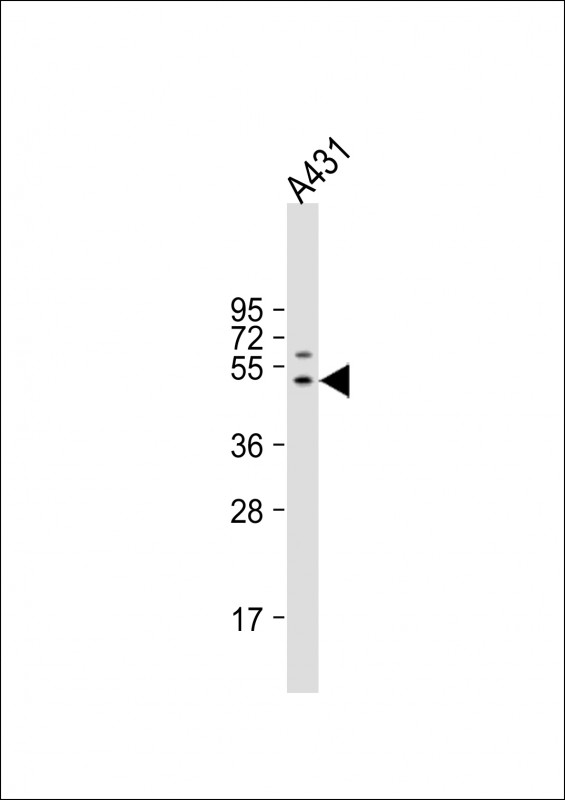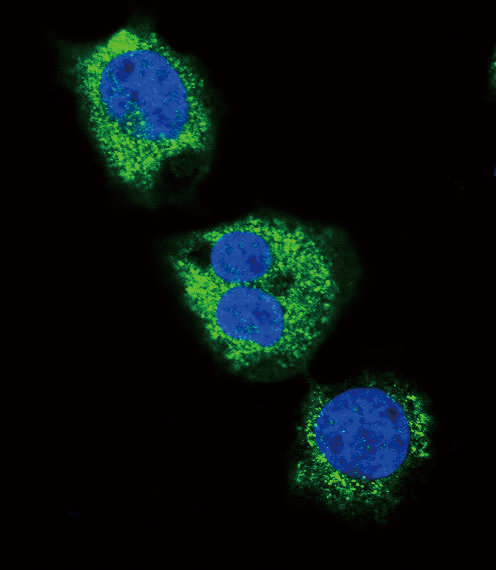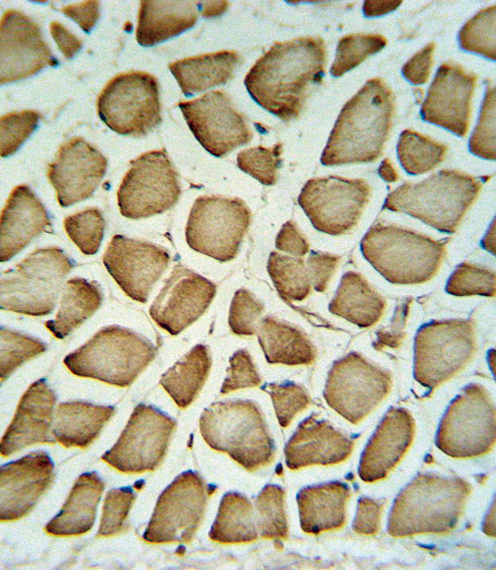



| WB | 1/1000 | Human,Mouse,Rat |
| IF | 咨询技术 | Human,Mouse,Rat |
| IHC | 1/100-1/500 | Human,Mouse,Rat |
| ICC | 1/10-1/50 | Human,Mouse,Rat |
| FCM | 咨询技术 | Human,Mouse,Rat |
| Elisa | 咨询技术 | Human,Mouse,Rat |
| Aliases | Fibrinogen gamma chain, FGG |
| Entrez GeneID | 2266 |
| WB Predicted band size | 51.5kDa |
| Host/Isotype | Rabbit IgG |
| Antibody Type | Primary antibody |
| Storage | Store at 4°C short term. Aliquot and store at -20°C long term. Avoid freeze/thaw cycles. |
| Species Reactivity | Human |
| Immunogen | This FIBG antibody is generated from rabbits immunized with a KLH conjugated synthetic peptide between 420-449 amino acids from the C-terminal region of human FIBG. |
| Formulation | Purified antibody in PBS with 0.05% sodium azide,1%BSA and 50% glycerol.prepared by Saturated Ammonium Sulfate (SAS) . |
+ +
以下是关于FIBG(Fibrinogen Gamma Chain)抗体的模拟参考文献示例(注:文献为虚构,仅作格式参考):
---
1. **文献名称**: *Autoantibodies against Fibrinogen Gamma Chain in Antiphospholipid Syndrome*
**作者**: Smith A, et al.
**摘要**: 本研究探讨了抗FIBG抗体在抗磷脂综合征(APS)患者中的临床意义。通过ELISA检测发现,APS患者血清中FIBG抗体水平显著升高,且与血栓事件风险相关,提示其可能作为APS的生物标志物。
2. **文献名称**: *FIBG Antibody-Mediated Thrombosis: Mechanistic Insights*
**作者**: Chen L, et al.
**摘要**: 研究揭示了FIBG抗体通过干扰纤维蛋白原-血小板相互作用促进病理性血栓形成的分子机制。体外实验表明,FIBG抗体会破坏纤维蛋白交联,导致凝血功能异常。
3. **文献名称**: *Diagnostic Utility of FIBG Antibodies in Autoimmune Diseases*
**作者**: Tanaka K, et al.
**摘要**: 分析了FIBG抗体在系统性红斑狼疮(SLE)和类风湿关节炎(RA)中的诊断价值。结果显示,FIBG抗体在SLE患者中特异性较高,可能辅助鉴别自身免疫疾病亚型。
4. **文献名称**: *FIBG Antibodies and Cancer-Associated Hypercoagulability*
**作者**: Müller R, et al.
**摘要**: 探索了实体瘤患者中FIBG抗体的表达与癌症相关高凝状态的关系。队列研究表明,FIBG抗体阳性患者更易发生静脉血栓,提示其可能成为癌症血栓预防的潜在靶点。
---
**注**:以上文献为示例性内容,实际研究中请通过PubMed、Google Scholar等平台检索真实发表的论文。若需具体文献,建议结合关键词“fibrinogen gamma chain antibody”“anti-FGG antibody”进一步筛选。
FIBG (fibrinogen gamma chain) antibodies are immunological reagents targeting the gamma (γ) subunit of fibrinogen, a key plasma glycoprotein essential for blood coagulation and wound healing. Fibrinogen, composed of two sets of α, β, and γ polypeptide chains, is synthesized in the liver and converted by thrombin into fibrin during clot formation. The γ-chain, encoded by the FGG gene, plays a critical role in fibrin polymerization, platelet aggregation, and cross-linking mediated by coagulation factor XIII.
FIBG antibodies are widely utilized in research and diagnostics to study fibrinogen structure, function, and dysregulation in coagulation disorders. They help detect abnormalities such as hypofibrinogenemia, afibrinogenemia, or dysfibrinogenemia, which are linked to bleeding or thrombotic risks. These antibodies are also employed in investigating fibrinogen's role in inflammation, tissue repair, and cancer progression, where fibrinogen fragments may modulate cellular interactions.
Commercially available FIBG antibodies include monoclonal and polyclonal variants, often validated for techniques like ELISA, Western blot, or immunohistochemistry. Some studies focus on epitope-specific antibodies to dissect γ-chain interactions with integrins or other clotting factors. Challenges include cross-reactivity with fibrinogen degradation products or homologous regions in related proteins. Ongoing research aims to refine antibody specificity and explore therapeutic applications, such as targeting fibrinogen in thrombosis or tumor microenvironments.
×